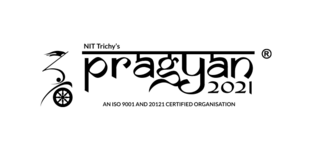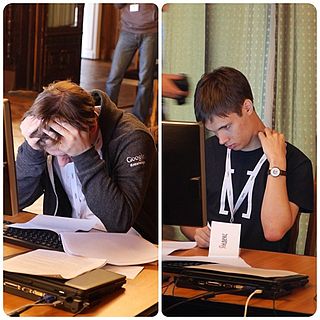
Philip Greenspun is an American computer scientist, educator, early Internet entrepreneur, and pilot who was a pioneer in developing online communities like photo.net.
Topcoder is a crowdsourcing company with an open global community of designers, developers, data scientists, and competitive programmers. Topcoder pays community members for their work on the projects and sells community services to corporate, mid-size, and small-business clients. Topcoder also organizes the annual Topcoder Open tournament and a series of smaller regional events.

Pragyan, NIT Trichy is the technical festival of the National Institute of Technology, Tiruchirappalli. Since its inception in 2005, it has been held every year over a period of three and a half days during the months of January, February, or March. Every year, participants from a number of colleges across the country take part in various events conducted as a part of Pragyan, making it one of the largest techno-managerial fests in India. It is also the first student-run organisation in the world and the third overall, next only to the London Olympics and Manchester United to get an ISO 20121:2012 certification for Sustainable Event Management. It also holds the ISO 9001:2015 certification for Quality Management Systems.

A hackathon is an event where people engage in rapid and collaborative engineering over a relatively short period of time such as 24 or 48 hours. They are often run using agile software development practices, such as sprint-like design wherein computer programmers and others involved in software development, including graphic designers, interface designers, product managers, project managers, domain experts, and others collaborate intensively on engineering projects, such as software engineering.

The Google Summer of Code, often abbreviated to GSoC, is an international annual program in which Google awards stipends to contributors who successfully complete a free and open-source software coding project during the summer. As of 2022, the program is open to anyone aged 18 or over, no longer just students and recent graduates. It was first held from May to August 2005. Participants get paid to write software, with the amount of their stipend depending on the purchasing power parity of the country where they are located. Project ideas are listed by host organizations involved in open-source software development, though students can also propose their own project ideas.

Mixxx is free and open-source software for DJing. It is cross-platform and supports most common music file formats. Mixxx can be controlled with MIDI and HID controllers and timecode vinyl records in addition to computer keyboards and mice.
Google Code Search was a free beta product from Google which debuted in Google Labs on October 5, 2006, allowing web users to search for open-source code on the Internet. Features included the ability to search using operators, namely lang:, package:, license:, and file:.
There are a number of competitions and prizes to promote research in artificial intelligence.

Google Code Jam was an international programming competition hosted and administered by Google. The competition began in 2003. The competition consists of a set of algorithmic problems which must be solved in a fixed amount of time. Competitors may use any programming language and development environment to obtain their solutions. From 2003 to 2007, Google Code Jam was deployed on Topcoder's platform. Since 2008 Google has developed their own dedicated infrastructure for the contest.
Neatx is an open-source NX server based on NoMachine's NX technology. It is created by Google. Neatx is written mostly in Python, with the exception of very few wrapper scripts in bash and one program written in C. Neatx is free and open-source software, subject to the requirements of the GNU General Public License (GPL), version 2.

Competitive programming is a mind sport usually held over the Internet or a local network, involving participants trying to program according to provided specifications. Contestants are referred to as sport programmers. Competitive programming is recognized and supported by several multinational software and Internet companies, such as Google and Facebook.

Trojitá is a free software IMAP and SMTP email client developed using the Qt C++ library. The design goals of the maintainers are to develop a fast e-mail client which respects open standards, is cross-platform and uses the available resources very efficiently.

Gennady Korotkevich is a Belarusian competitive programmer who has won major international competitions since the age of 11, as well as numerous national competitions. His top accomplishments include six consecutive gold medals in the International Olympiad in Informatics as well as the world championship in the 2013 and 2015 International Collegiate Programming Contest World Finals. As of December 2022, Gennady is the highest-rated programmer on CodeChef, Topcoder, AtCoder and HackerRank. In January 2022, he achieved a historic rating of 3979 on Codeforces, becoming the first to break the 3900 barrier.

Outreachy (previously the Free and Open Source Software Outreach Program for Women) is a program that organizes three-month paid internships with free and open-source software projects for people who are typically underrepresented in those projects. The program is organized by the Software Freedom Conservancy and was formerly organized by The GNOME Project and the GNOME Foundation.
SwellRT was a free and open-source backend-as-a-service and API focused to ease development of apps featuring real-time collaboration. It supported the building of mobile and web apps, and aims to facilitate interoperability and federation.
freeCodeCamp is a non-profit organization that consists of an interactive learning web platform, an online community forum, chat rooms, online publications and local organizations that intend to make learning software development accessible to anyone. Beginning with tutorials that introduce students to HTML, CSS and JavaScript, students progress to project assignments that they complete either alone or in pairs. Upon completion of all project tasks, students are partnered with other nonprofits to build web applications, giving the students practical development experience.

hackers.mu is a group of developers from Mauritius who are focused on computer security, IETF standards and Linux and Open Source Software adoption. They have worked on implementing TLS 1.3 in Linux and Open Source Software during the IETF 100 Hackathon as part of the TLS Working Group. They have also prepared high school students for Google Code-in in 2016 which marked the first time that Mauritius participated. In 2017, they trained another batch of high school students and this would lead to the first Grand Prize Winner for Mauritius. During IETF 101, hackers.mu acted as TLS 1.3 champions, and continued to work on application integration support. In June 2018, hackers.mu organized a hackathon with codename "Operation JASK" to fix sigspoof3 in a number of open source projects. In July 2018, hackers.mu participated in IETF 102 hackathon as TLS 1.3 champions to work on inter-operability and applications support and http 451. Additionally, they have been active in authoring IETF Standards such as RFC 8270.
Codeforces is a website that hosts competitive programming contests. It is maintained by a group of competitive programmers from ITMO University led by Mikhail Mirzayanov. Since 2013, Codeforces claims to surpass Topcoder in terms of active contestants. As of 2018, it has over 600,000 registered users. Codeforces along with other similar websites are used by some sport programmers, like Gennady Korotkevich, Petr Mitrichev, Benjamin Qi and Makoto Soejima, and by other programmers interested in furthering their careers.
Gazebo is an open-source 3D robotics simulator. It integrated the ODE physics engine, OpenGL rendering, and support code for sensor simulation and actuator control.
Catrobat is a block-based visual programming language and Open Source Software non-profit project. The first release dates back to 2010 and was initiated by Wolfgang Slany from the Technical University Graz in Austria. The multidisciplinary team develops the programming language and free apps for teenagers to create their own games, animations, music videos or all other kinds of apps directly on a smartphone based on the catrobat framework.















